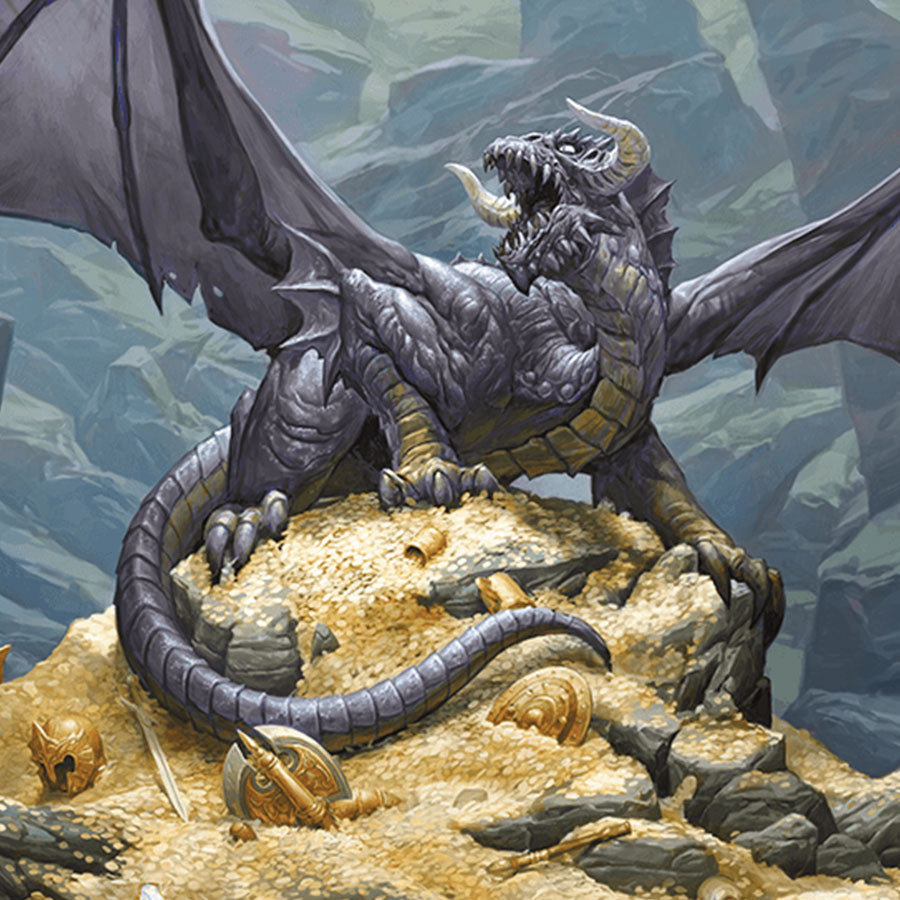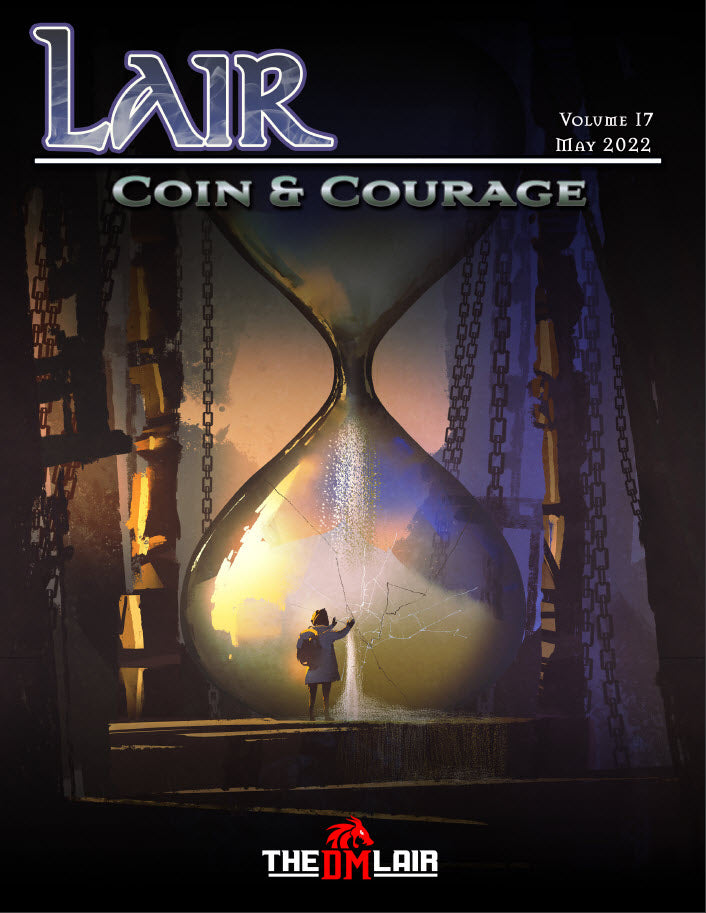Advanced Rewards & Recognition System for D&D 5e

Kill monsters, get gold. Kill more monsters, get more gold. Kill even more monsters, get even more gold. Wow, this is exciting. Oh, and don’t forget about magic items! So, gold and magic items: those are the only rewards we give our players from levels 1 to 20. I wonder if that gets old after awhile…
Of course, it does. If you’re as frustrated as many other dungeon masters with how boring the standard out-of-the box rewards and treasure is for Dungeons & Dragons 5e, you’re in the right place. Today, we're going over 16 alternative ways dungeon masters can reward their D&D players.
Now, I'll be explaining the premise of our new Rewards & Recognitions System in this post, but if you want to get the entire system, complete with alternative rewards for every tier of gameplay from level 1 to 20, it’s available in the May 2022 issue of Lair Magazine, Coin & Courage. There are tables for minor, moderate, major, and legendary rewards that correspond to each of the four tiers of gameplay. You can roll on the tables for a random reward or pick the one that appeals to you the most or that you think your players would think is really cool.
Watch or listen to this article by clicking the video below.
Number 1: Appointments
Basically, a character is given a position within the town. This could be an honorary membership in the Guard or maybe even a military authority or military rank.
They might be granted an office in the church or the local government, and this could give them benefits such as a bonus to persuasion within that organization and perks such as finding shelter within the church or getting help from the guard when engaging enemies within the town. They might also take part in policy or law discussions, have access to porters, messengers, and other agents as appropriate.
Just be careful. Remember, if they have an office with the guard and they might have some military authority that guards don't take on super powerful enemies. That's what adventurers do.
In fact, that is exactly what people in cities do. They hire adventurers to take on the big bad enemies. There are players who are going to be like, well, if I'm a captain of the guard, I could just have the guard go fight the people in the dungeon and I can get all the rewards. No, that doesn't work that way.
Number 2: Decorations
Decorations for exemplary service to the town can be an amazing reward for players. A character or all of the characters in a group might be granted a decoration such as a Mayor's Medal of Honor or High Priest’s Golden Dove. This gets them a discount on services in the town for a few weeks and they get a medal or ribbon that has some gold piece value attached to it just in case they want to sell it. Of course, as they get higher in level, these rewards and the decorations get better and better.
Number 3: Services
Religious and healing services are a clear pick here because we need to have healing, greater restoration when we get turned to stone, being risen from the dead, all those types of good things. They might also be granted a castor’s services such as casting teleport, plane shift, and things like that. Or they could just get a discount on vendor items.
Number 4: Transportation
They might be granted special transportation for exemplary service to a patron or the city or some important personage: a cart, a fine horse, a wagon, a warhorse, a ship including crew, or teleportation circle access. Of course, if they're granted a crew, they're going to have to be paid though. That crew doesn't just work for free, and it'll fall upon the players to pay their salaries.
Number 5: Contacts
Sometimes it isn't just the money that you have in your pocket, but it's the connections you have. It's the important people that you know because they can grant you favors and help you out when you really need it. These contacts might be in a certain organization within the city or region. They could be in the government. They could be in the church. Grant your characters favors, such as helping them gather information. Maybe they can get them meetings with important people. They can deliver messages, help them gather supplies, that sort of thing, but they don't help them in combat.
I think we're starting to get a reoccurring theme here. The goal of the rewards and recognition system is to give your players cool things that they can use as they play the game. It's not to be used as a way NOT to play the game. You see, combat's a part of the game, so if you're giving them things that allow them to bypass combat and essentially not play the game, it's counterproductive if your players and you enjoy that part of the game.
Number 6: Training
Yes, learn stuff. You want to learn how to brew stuff, make some nice ale or wine. We all need some of that after a hard day at work, don't we? Or learn languages. I have had players who were just language freaks and wanted to learn every language in the game. It comes in very handy.
Just note that if the characters are granted access to a trainer who will train them for free on a tool or language of their choice, it does take time. It is not an instantaneous thing. Nobody learns how to do something proficiently overnight. Now, this could be part of downtime or however you want to do it, but it takes time even if it doesn't cost them any gold pieces. It needs to be a realistic, I think. Otherwise, you're just like, oh, I learned language overnight. Wow. Unless it's magic, I guess…
Number 7: Hirelings
These don't necessarily have to be hirelings that accompany them on adventures, helping them with combat and stuff like that, though they could, but I'm mostly talking about hirelings that help do things like run errands, help with interests in the city, manage properties the PCs own.
In the Ancient Dragon game that I run for my patrons, the characters have a mayordomo named Petra, who helps manage their various properties that they have acquired in the city. Of course, they've been gone from the city for quite some time now, and who knows what things are going to have happened when they get back—if they ever get back.
Number 8: Membership in an Organization
They did great. They performed so well on that adventure, on that mission, that they have been awarded with membership in a merchant guild, an adventurer’s guild, or a thieves guild. That’s some nice prestige there, but they also get guild perks such as access to guild areas and contacts. Guild products at a discount or no cost, a place to sleep, to lay your head at night. The list goes on.
Number 9: Public Recognition
You could get a feast at a lord's mansion, a large public banquet recognition at a festival, public announcement of heroic acts, a parade, a monument built in their recognition, a name commemoration like on a street or a building named after them or cool, cool stuff like that.
This toilet over here named after me…that's like a level one reward. But a medal of honor could grant a PC advantage on charisma checks with the local populace for a certain time period because they were just publicly recognized.
Number 10: Favors
They did well on that quest the important personage that asked them to do it grants them a favor to be cashed in at a later point in time at higher levels of gameplay. You can even get royal favors or divine favors if you are even higher level. The type of favor should be suitable to the level of the characters and not put the personage in danger. And it’s probably it's going to exclude helping them in combat unless it's something very minor or happens “off screen” because remember, we want our players to be able to continue playing the game.
Number 11: Patronage
So, the characters are doing amazing. They're doing great stuff for that city, lots of benefits going around. A wealthy patron therefore decides to take the PCs under their wings. They offer them room and board and pay for their traveling expenses, and they provide other resources and perks as well. Of course, the patron is getting a little bit of recognition and bragging rights because, hey, that's my group of adventurers over there doing all those cool things. The patron also probably expects services in return, and why wouldn’t they? But that’s just an opportunity to continue the adventures!
Number 12: Special Privileges
Special privileges for performing admirably in the city's service and wiping out a whole bunch of bad guys makes sense. Your characters are granted a special privilege in the city. This might be staying out past curfew, being allowed to carry weapons in public buildings, access to certain areas, the right to search businesses or private dwellings, diplomatic immunity, access to important personages without an appointment—and the list goes on.
Number 13: A Business
Now, first at the lower levels, you might enter a partnership with a business, but later on the group might own their own businesses. This might resolve from an adventure where they defeat an enemy who owns a business and then they're rewarded with ownership of that business. Now, local employees manage the day-to-day affairs of the business, but the PCs get a percentage of the profits. Of course, unless you want to run a D&D game where your group is just managing a business and that's what you do. I mean, you could do that if you want…
Number 14: Properties
You could own a plot of land, a townhouse, a mansion, a small fortification, a stronghold, which is like a fortified keep or a tower or even a castle. Of course, at low levels you get the little stuff and then as you gain levels, you get the better stuff. Now, the characters would be granted ownership of that property, but if there is a staff or guards, the characters are responsible for paying their expenses. This gives them something to do with all their gold pieces because that is a problem in D&D 5e…all this gold and nothing to do with it.
Number 15: Titles
You could be granted a special title such as a Squire Knighthood, a Baron, a Duke, Prince, or even King or Queen. You get invitations to high society's social events and recognition among the nobility. Higher titles could even give you authority over the law in the area that you rule. Basically, you make the rules. You are the law. Now, of course, with titles such as these, there are expectations that they will perform service according to their title. For instance, a Knight Defender, the Lord of the City, and the Baron is expected to keep peace and order in the region under their rule.
Number 16: Nobility
Okay, so I guess titles are different than nobility. Anyway, this could start with a alliance with a noble family granting access to family members, their estates and reasonable resources available to nobles, and later it can lead to adoption into the noble or royal family if the characters continue to further the family's causes. Of course, this could also lead to a rivalry with other noble families who have feuds with first on the screen.
Rewards & Recognition System
If you’d like to get our complete Rewards & Recognition System, you can pick it up in the May 2022 issue of Lair Magazine, Coin & Courage. It has alternative rewards for every tier of gameplay from level 1 to 20 and includes tables for minor, moderate, major, and legendary rewards that correspond to each of the four tiers of gameplay.
-
Posted in
Game Master How-To Articles







